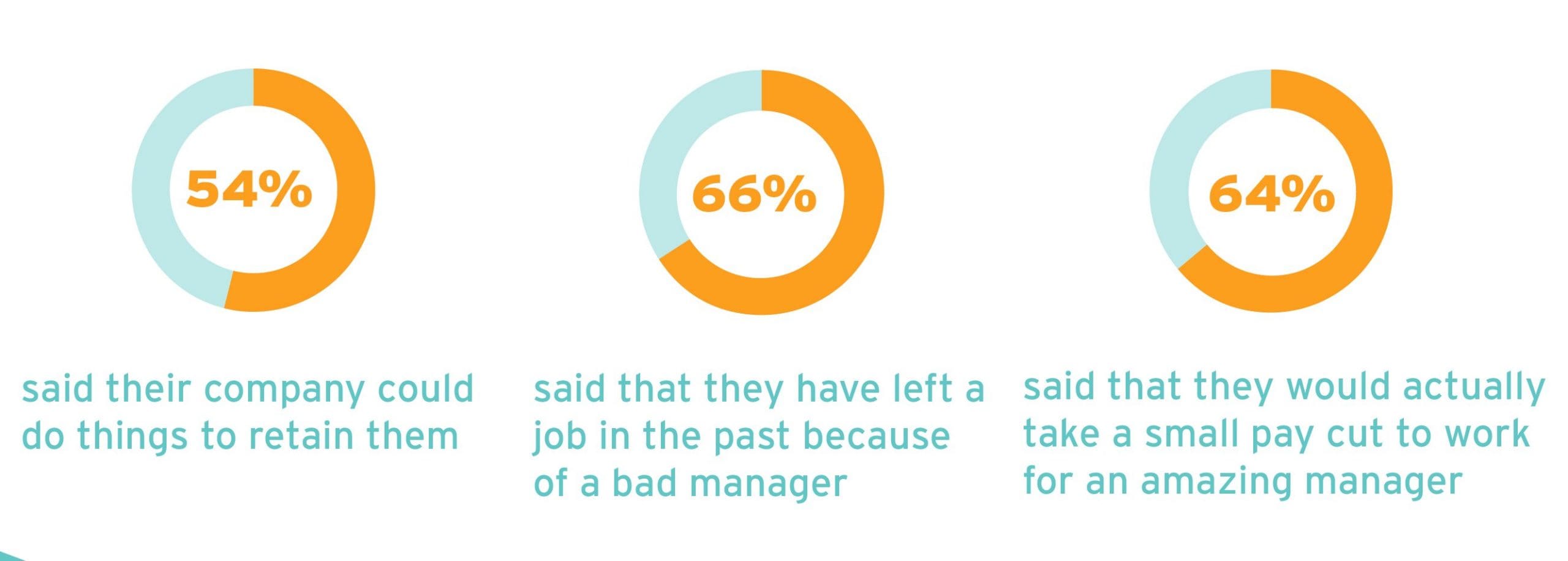
We Surveyed Professionals to Understand the Impact of Bad Managers
December 18, 2019 Written by Josh Hrala

Compare Providers
Download our outplacement comparison sheet
Request Pricing
Compare our rates to other providers
There’s an old saying that gets brought up every time someone quits an organization. It goes something like: ‘people don’t quit their companies, they quit their managers.’
But is it really that simple?
Based on some of the latest research, toxic cultures are a prime reason people have for leaving their jobs in this current economic climate. Workers in these studies reported that their managers willfully ignore toxicity, do not fully understand how to manage and/or develop them, and are solely to blame for workers not feeling safe in the workplace.
That’s a lot of heavy accusations being thrown at managers.
To get the bottom of this, we wanted to go straight to the source – actual workers – to understand how they felt about their managers. Specifically, we wanted to take a look at how poor management is viewed by professionals.
Here’s what we found.
First, What’s More Important?
The first question we asked was simple: what’s more important? Working for a company with a great culture or working for a really great manager?
The vast majority – 68 percent – said the latter. 32 percent said a great culture.
Now, it’s important to note that these two things are very close to one another, right? A company with a great culture most likely also has a lot of really great managers who help carve out that culture. However, these results are interesting because it suggests that workers will work for a potentially toxic organization overall as long as their managers are great.
This helps to highlight just how much weight is put on individual managers in the workplace. They seemingly have the power to retain, engage, and boost productivity in a way that other initiatives simply do not.
So what happens when there’s a bad manager?
Retention and Poor Management
From there, we moved on to asked workers if a company could do anything – other than give them a new manager – to retain them if their manager wasn’t up to snuff.
In a twist of events, most said yes, the company could do things to retain them. 54 percent said so. However, they do not expound on what those changes might be.
Your first thought may go into compensation. If someone is about to walk out of the door because of a manager, a pay boost will surely help ease things over, right?
Not at all.
According to our survey, 64 percent of workers said that they would actually take a small pay cut to work for an amazing manager. This shows that great leadership has a real, honest value. If people enjoy their work, get proper attention, work in a non-toxic environment, and other things spurred on by great leaders, they will stick around longer even if an offer is on the table.
That being said, poor managers cause an awful lot of turnover. 66 percent of those surveyed said that they have left a job in the past because of a bad manager.
This backs up a more recent study that found that most workers are actually one decent – not even great – offer away from leaving their current roles. While this stat is sort of undermined by our findings, that study was a lot larger and spanned a lot more industries – so we’re going to take their word for it.
In fact, if you were to look at all of the stats combined, you’d see that there is actually some sort of management issue afflicting the US right now. It seems like every worker is mere moments away from leaving their role. In most of these situations, workers are driven to this point from actions taken directly by their manager.
Great Management Is a Talent Magnet
While poor management can drive talent away in droves, great managers are actually one of the most important things people consider when joining a company.
This means that having a great manager, again, adds a tremendous amount of value to the organization and can help attract, retain, and engage top tier talent.
We asked our survey participants to rank, in order of importance, various organizational elements were, specifically these items:
- Having a great manager
- Believing the purpose of the organization
- Having great healthcare
- Remote flexibility
- Competitive compensation
- Having adequate PTO
Participants ranked these items out of 10.
In the end, there was a tie between ‘having a great manager’ and ‘competitive compensation.’ This makes a lot of sense, especially given the other research that has come out lately. Basically, workers want to be paid what they’re worth and they want a manager that is capable enough to develop them into the future.
In second, came ‘believing in the purpose of the organization.’ In third, a tie between healthcare and having adequate PTO. In last place, remote flexibility.
These rankings are all logical conclusions. Management and pay are top, as they typically always are, and other benefits fall somewhere after them. People also love working for places that they care about personally, meaning that the company’s agenda and mission aligns with the worker’s.
The other benefits are all more commonplace now. Having a great healthcare plan – though still not accessible for all workers, especially those in lower paying roles – PTO time, and remote flexibility are all on a smaller sliding scale. Most forward-thinking organizations have these benefits even if they differ slightly. The real difference is how managers can shift based on workplace culture.
Back to Our Original Question
So is the old adage true? Do people really leave their managers and not their organizations?
It’s still sort of muddled, isn’t it? Based on our data, yes, people will leave their organization because of their manager (and low pay, too). However, we argue that management is led by the organization. This means that upper level management – the ones who place all of the middle managers – are also to blame for quits that have to do with individual managers. And, at that point, poor management becomes an institutional problem.
The flaw with the old adage is that it improperly places blame on sole individuals – this manager or that manager – while failing to account for the organization’s role in hiring that manager and allowing them to drive off staff.
In the end, management is led from the top. If everyone isn’t onboard and toxic managers are left to fester, entire organizations suffer.
All of this is to say, yes, people do quit their managers more than they quit their organizations. But in reality, the two are so intimately intertwined that it’s hard to untangle one from the other.
What all of these results do indicate, though, is that if an organization does have a retention problem, they should first start by looking at their managers because they play a huge role.
Understanding the importance of good managers should allow forward-thinking organizations to better hire them, which – in turn – will help talent across the board.
In need of outplacement assistance?
At Careerminds, we care about people first. That’s why we offer personalized talent management solutions for every level at lower costs, globally.




